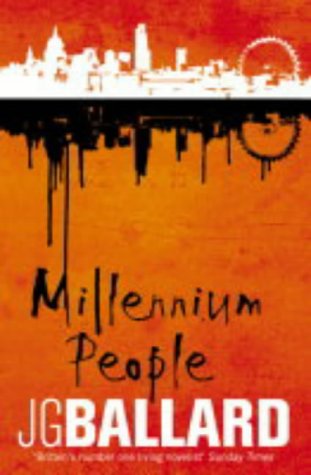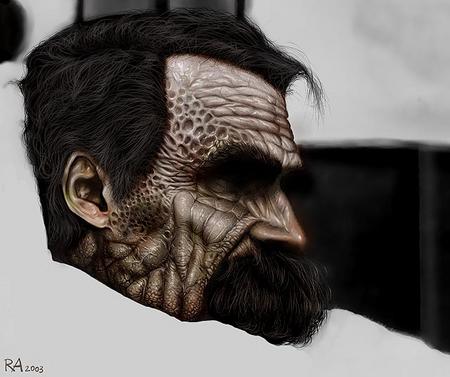March 08, 2005
What are the politics of boredom? (Ballard 2003 remix)
'Prosperous suburbia was one of the end states of history. Once achieved, only plague, flood, or nuclear war could threaten its grip.' (Ballard, Millennium People, 91)
'J.G. Ballard' is the name of a repetition.
That's very different from saying that Ballard repeats himself. On the contrary, it is Ballard's formalism, his repermuation of the same few concepts and fixations - disasters, pilots, random violence, mediatization, the total colonization of the unconscious by images - that prevent his name being easily attributed to any self.
The obsessive quality of his preoccupations and his methodology is a sign that Ballard has never lost faith with his earliest inspirations: psychoanalysis and surrealism. In both, he found a rigorously depersonalized account of the formations of the person. The so-called interior had a logic that could be both exposed and externalised.
Ballard's career can be seen as a repeated rewriting of two texts of Freud, 'Civilization and Discontents' and 'Beyond the Pleasure Principle'. The environmental catastrophes in his earliest phase of novels (The Drowned World, The Drought, The Crystal World) tend to be greeted by the characters as opportunities, chances to shuck off the dull routines and protocols of sedentary society. The second phase of his work, which began in the mid-Sixties and to some extent continues to this day, follows this logic through so that the catastrophes and atrocities that afflict the characters in these fictions are actively willed by them. (Or is it that the humans seek to manage, through repetition, the originary trauma of their being?) Disasters are now the disasters of the media landscape - the space in which humans now primarily live, and one which is both shaped by, and manufactured from, their desires and drives. Once again, though, we must qualify this claim with the further observation that human beings are not the 'owners' of desires and drives - they don't 'have' them. Rather, human beings are the playing out of these impulses, instruments through which trauma is registered.
Since High Rise in 1975, Ballard has directed most of his attention to the hyper-affluent and bored denizens of closed communities. If Ballard's treatment of the mores of this population had begun to pall, it was refreshed by Millennium People, his latest and best rendition of this theme.

The world of Millennium People is ruled, 'for the first time in history' (but not for the first time in Ballard's work), by a 'vicious boredom' 'interrupted by meaningless acts of violence'. At first glance, the novel can look like a long overdue savaging of the middle class, in which the reader can revel in the brutal destruction of bourgeois sacred cows. Tate Modern... Pret-a-manger.... the NFT... all of them burn in Ballard's Bourgeois Terror.
'I'm a fund raiser for the Royal Academy. It's an easy job. All those CEOS think art is good for their souls.'
'Not so?'
'It rots their brains. Tate Modern, the Royal Academy, the Hayward.... they're Walt Disney for the middle classes.' (61)
The novel's middle class insurgents seem, at first, to be merely the hard done-to whiners whose plaints about the rising expense of child care and school fees and the 'inequity' of too high rents in their not quite luxurious enough appartments are the stuff of endless media columns. 'Believe me, the next revolution is going to be about parking' (66) one character announces, echoing the petrol blockades of four years ago and anticipating the Ikea riots of 2005. Once their discontent is stirred up, however, the goals of this group of former professionals become less specific, less instrumentalist.
Like the Situationists, the insurgents of Ballard's fictional Chelsea Marina want to 'destroy the twentieth century'.
'I thought it was over.'
'It lingers on. It shapes everything we do, the way we think. ... Genocidal wars, half the world destitute, the other half sleepwalking through its own brain-death. We bought its trashy dreams and now we can't wake up.' (63)
Millennium People is in many ways Britain's answer to Fight Club (though, needless to say, the chances of Britain producing MP as a film that would even remotely do the book justice are not even slight - precisely because the British film industry is under the control of the same militantly complacent whingers that it attacks). Like Fight Club, the novel begins with a rage against the bullet-pointed, brand-consulted hyper-conformity of modern professional life, but ends up in surfascism.
The most important figure in this respect is Richard Gould who, like most of Ballard's other characters, is little more than a spokesperson for the author's theories. (Which is fine, of course: we need more 'well-drawn characters' like we need more 'well-wrought sentences'. The UEA Eng Lit mafia are as ripe for immolation as are any of the other cosily depressing targets of Ballard's pyromaniac prose.)
Gould reiterates essentially the same attack on the 'air-conditioned totalitarianism' of contemporary securo-culture that had been essayed by Nietzsche, Mauss, Bataile, dada, surrealism, Situationist theory, Lettrism, Baudrillard and Lyotard. 'We're living in a soft regime prison built by earlier generations of inmates. Somehow we have to break free. The attack on the World Trade Centre in 2001 was a brave attempt to free America from the 20th century. The deaths were tragic, but otherwise it was a meaningless act. And that was its point. Like the attack on the NFT.' (140)
Gould re-states the Nietzschean claim that human beings need cruelty, danger and challenge, but that civilization gives them security. Gould, though, is as reminiscent of Fukuyama's rehearsal of Nietzsche's discontent with civilization as he is of Nietzsche himself.
It is Fukuyama's Nietzsche - the scourge of bland egalitarianism and empty inclusiveness - that is the most relevant Nietzsche today. As you read the appalled invective with which Nietzsche blasts the herd-cult of managed security (which is so weak and insipid that it can never utter its real rallying cry: 'long live mediocrity!') you can't help but think of Blair and the Millennium Dome, whose pallid, paradoxically self-deprecatory pomposity contrasts unhappily with the cruel opulence of the monuments erected in Nietzsche's beloved tragic and heroic aristocratic societies.
'Democratic societies,' Fukuyama wrote in The End of Jistory and the Last Man '... tend to promote a belief in the equality of all lifestyles and values. They do not tell their citizens how they should live, or what will make them happy virtuous and great. Instead they cultivate the value of toleration, which becomes the chief virtue in democratic societies. And if men are unable to affirm that any particular way of life is superior to another, they will fall back on the affirmation of life itself, that is, the body, its needs, and fears. While not all souls may be equally virtuous, all bodies can suffer; hence democratic societies will tend to be compassionate and raise to the first order of concern the question of preventing the body from suffering. It is not an accident that people in democratic societies are preoccupied with material gain and live in an economic world devoted to the myriad small needs of the body. According to Nietzsche, the last man has "left the region where it was hard to live, for one needs warmth".' (305)
'We need to pick targets that don't make sense.' (175)
If the characters in The Atrocity Exhibition wanted to restage the founding traumatic of the media 60s - the assassination of Kennedy - then Gould and his allies want to restage the founding traumatic moment of the media 00s- 9/11. But where Traven/Tallis/Travis wanted to kill Kennedy again, 'but this time in a way that makes sense', Gould wants 9/11 to happen again, but in a way that doesn't make sense.

For Gould, the (post)modern world is oppressed by an excess of Sense, a surplus of Meaning. 'Kill a politician and you're tied to the motive that made you pull the trigger. Oswald and Kennedy, Princip and the Archdukes. But kill someone at random, fire a revolver into McDonald's - the universe stands back and holds its breath. Better still, kill fifteen people at random.' (176) Thus, the Jill Dando murder is more of a template for Gould's anti-political insurgency than is September 11th, whose violence was (still) too motivated, too freighted with Meaning. Dando's killing however - brutal, meaningless, and without any apparent motive - was a direct attack on the BBC's 'regime of moderation and good sense' (149) and the 'castle of obligations' (166) it protects. An action like this, whose only motive is an attack on the concept of motive itself, blows open an 'empty space we could stare into with real awe. Senseless, inexplicable, as mysterious as the Grand Canyon.' (249)
Gould is an elegant and eloquent salesman of the Deleuze-Guattari 'line of abolition', the Fascist drive to destruction which is ultimately a drive towards self-destruction. Ballard, who, to his credit has always refused to endorse facile moralizing, would no doubt object to that characterization, since to in any way condemn or censure Gould would be to confirm the very securocratic values he seeks to undermine.
However, the most compelling aspect of Millennium People, politically speaking, is not the in many ways familiar asignifying violence, but its PUNK THEORY OF CLASS REVOLT.
'Twickenham is the Maginot Line of the English class system. If we can break through here, everything will fall.'
'So class systems are the target. Aren't they universal - America, Russia...?'
'Of course. But only here is the class system a means of political control. Its real job isn't to suppress the proles, but to keep the middle classes down, make sure they're docile and subservient.' (85)
The moment at which Ballard's 'new proletariat' ('furnished with private schools and BMWs') become real political actors is when they cease to pursue their own class interests. Only then can they come to the Marxist revelation that bourgeois class interests are in no-one's interests.
'They see that private schools are brainwashing their children into a kind of social docility, turning them into a professional class who will run the show for consumer capitalism.'
'The sinister Mr Bigs?'
'There are no Mr Bigs. The system is self-regulating. It relies on our sense of civic responsibility. Without that society would collapse. In fact, the collapse may even have begun.' (104)
Blairism has consolidated and outstripped the ideological gains of Thatcherism by ensuring the apparently total victory of PR over punk, of politeness over antagonism, of middle class utility over Proletarian art. It manages the tricky ideological dodge of reducing everything to instrumentality whilst AT THE SAME TIME dedicating all resources to the production of cultural artifacts of no possible use or function. From the Mayan codices to Mission Statements.... Spin engenders a Meaninglessness which, in the mandatory banality of its corrosive nihilism, makes Gould's grand poetics of asignifying rupture seem quaintly nostalgic.

Blair has made middle class security the horizon of all aspiration. In this overconscious, overlit 24 hour office of the soul, Business, preposterously, is served up to us as the closest thing to anything animated by libido. Ballard knows that a break out from this affective prison must involve the explicit de-cathexis of the 'nice house, nice family' picture that bourgeois culture is still capable of projecting as ideal.
In histories of punk, much is made of the role of the middle classes, but the crucial catalytic role of that particular kind of middle class refusal remains under-thought. The middle class defection from reproductive futurism into scarification and tribalization did nothing more than state the obvious - middle class careers and the privileges they bring are empty, tedious and ennervating - but, now more than ever, it is this obviousness that cannot be stated.
'The interesting thing is that they're protesting against themselves. There's no enemy out there. They know that they are the enemy.' (109)

